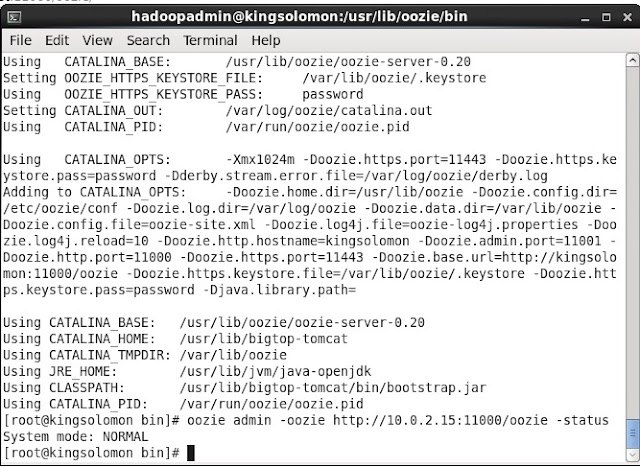Java API for Invoking Oozie Workflows
Java Client API for the integration of Apache Oozie and Java
applications. Here I will explain about Java API for
interacting/invoking Apache Oozie Jobs.
There are two approaches
for writing Java code for invoking Oozie jobs.
- Oozie Client Java API
- Local Oozie Client Java API
You can download below explained project and related configuration files from the link ExecuteOozieJobUsingJavaAPI or from GitHub download link
Oozie Client Java API
This approach
will explain how to submit an Oozie job using the Java Client API.
Below code will elaborate the step for writing Apache Oozie Client.
import
org.apache.oozie.client.OozieClient;
import
org.apache.oozie.client.WorkflowJob;
.
import java.util.Properties;
.
...
.
// get a OozieClient for the Oozie
OozieClient wc = new OozieClient("http://kingsolomon:8080/oozie");
.
// create a workflow job configuration and set the workflow
application path
Properties conf = wc.createConfiguration();
conf.setProperty(OozieClient.APP_PATH, "hdfs://kingsolomon:9000/myapp");
.
// setting workflow parameters
conf.setProperty("jobTracker", "kingsolomon:9001");
conf.setProperty("inputDir", "/myapp/inputdir");
conf.setProperty("outputDir", "/myapp/outputdir");
...
.
// submit and start the workflow job
String jobId = wc.run(conf);
System.out.println("Workflow job submitted");
.
// wait until the workflow job finishes printing the status every 10
seconds
while (wc.getJobInfo(jobId).getStatus() == Workflow.Status.RUNNING) {
System.out.println("Workflow job running ...");
Thread.sleep(10 * 1000);
}
.
// print the final status of the workflow job
System.out.println("Workflow job completed ...");
System.out.println(wf.getJobInfo(jobId));
...
|
Sample Java program to
call workflow
Suppose your project ExecuteOozieJobUsingJavaAPI path is /user/hadoopadmin/Desktop/ExecuteOozieJobUsingJavaAPI. Also workflow.xml and other files are in the project folder. You can get the these files and Java code from above source code project folder link. Put all these file & folder inside HDFS, so these are available for Map Reduce jobs internally using by Apache Hive.
For reference please go through the workflow.xml file which is in the project folder.
Here we need to set all properties which we have used in the workflow.xml file
Note : Ensure to replace configuration highlighted properties with your environment specific configuration.
import java.util.Properties;
import org.apache.oozie.client.OozieClient;
import org.apache.oozie.client.WorkflowJob;
public class ExecuteOozieScheduler {
public static void main(String[] args) {
OozieClient wc = new OozieClient("http://kingsolomon:11000/oozie");
Properties conf = wc.createConfiguration();
conf.setProperty(OozieClient.APP_PATH,
"hdfs://kingsolomon:9000/user/hadoopadmin/Desktop/ExecuteOozieJobUsingJavaAPI/workflow.xml");
conf.setProperty("jobTracker", "kingsolomon:9001");
conf.setProperty("nameNode", "hdfs://kingsolomon:9000");
conf.setProperty("queueName", "default");
conf.setProperty("dbScripts",
"hdfs://kingsolomon:9000/user/hadoopadmin/Desktop/ExecuteOozieJobUsingJavaAPI");
conf.setProperty("rootFolder",
"hdfs://kingsolomon:9000/user/hadoopadmin/Desktop/ExecuteOozieJobUsingJavaAPI");
// HDFS directories (multiple directories can be separated by a comma) that contain JARs
conf.setProperty("oozie.libpath", "hdfs://kingsolomon:9000/user/oozie/share/lib");
conf.setProperty("oozie.use.system.libpath", "true");
conf.setProperty("oozie.wf.rerun.failnodes", "true");
try {
String jobId = wc.run(conf);
System.out.println("Workflow job, " + jobId + " submitted");
while (wc.getJobInfo(jobId).getStatus() == WorkflowJob.Status.RUNNING) {
System.out.println("Workflow job running ...");
Thread.sleep(10 * 1000);
}
System.out.println("Workflow job completed ...");
System.out.println(wc.getJobInfo(jobId));
} catch (Exception r) {
System.out.println("Errors " + r.getLocalizedMessage());
}
}
}
|
Local Oozie Client Java API
Oozie provides an embedded Oozie implementation, LocalOozie , which is
useful for development, debugging and testing of workflow applications within
the convenience of an IDE.
The code snipped below shows the usage of the LocalOozie class. All
the interaction with Oozie is done using Oozie OozieClient Java API,
as shown in the previous section.
The examples bundled with Oozie include the complete
and running class, LocalOozie Example from where this snipped was
taken.
Below code will elaborate the step for writing Local Oozie Client.
import org.apache.oozie.local.LocalOozie;
import org.apache.oozie.client.OozieClient;
import org.apache.oozie.client.WorkflowJob;
.
import java.util.Properties;
.
...
// start local Oozie
LocalOozie.start();
.
// get a OozieClient for local Oozie
OozieClient wc = LocalOozie.getClient();
.
// create a workflow job configuration and set the workflow application path
Properties conf = wc.createConfiguration();
conf.setProperty(OozieClient.APP_PATH,
"kingsolomon:9000/myapp");
.
// setting workflow parameters
conf.setProperty("jobTracker", "kingsolomon:9001");
conf.setProperty("inputDir", "/myapp/inputdir");
conf.setProperty("outputDir", "/myapp/outputdir");
...
.
// submit and start the workflow job
String jobId = wc.run(conf);
System.out.println("Workflow job submitted");
.
// wait until the workflow job finishes printing the status every 10 seconds
while (wc.getJobInfo(jobId).getStatus() == Workflow.Status.RUNNING) {
System.out.println("Workflow job running ...");
Thread.sleep(10 * 1000);
}
.
// print the final status o the workflow job
System.out.println("Workflow job completed ...");
System.out.println(wf.getJobInfo(jobId));
.
// stop local Oozie
LocalOozie.stop();
...
|
Sample Java program to call LocalOozie workflow
Here we need to set all properties which we have used in the workflow.xml file
Note : Ensure to replace configuration highlighted properties with your environment specific configuration.
import java.util.Properties;
import org.apache.oozie.local.LocalOozie;
import org.apache.oozie.client.OozieClient;
import org.apache.oozie.client.WorkflowJob;
public class ExecuteLocalOozieScheduler {
public static void main(String[] args) throws Exception {
LocalOozie.start();
// get a OozieClient for local Oozie
OozieClient wc = LocalOozie.getClient();
Properties conf = wc.createConfiguration();
conf.setProperty(OozieClient.APP_PATH,
"hdfs://kingsolomon:9000/user/hadoopadmin/Desktop/ExecuteOozieJobUsingJavaAPI/workflow.xml");
conf.setProperty("jobTracker", "kingsolomon:9001");
conf.setProperty("nameNode", "hdfs://kingsolomon:9000");
conf.setProperty("queueName", "default");
conf.setProperty("dbScripts", "/user/hadoopadmin/Desktop/ExecuteOozieJobUsingJavaAPI");
conf.setProperty("rootFolder", "/user/hadoopadmin/Desktop/ExecuteOozieJobUsingJavaAPI");
// HDFS directories (multiple directories can be separated by a comma) that contain JARs
conf.setProperty("oozie.libpath", "hdfs://kingsolomon:9000/user/oozie/share/lib");
conf.setProperty("oozie.use.system.libpath", "true");
conf.setProperty("oozie.wf.rerun.failnodes", "true");
try {
String jobId = wc.run(conf);
System.out.println("Workflow job, " + jobId + " submitted");
while (wc.getJobInfo(jobId).getStatus() == WorkflowJob.Status.RUNNING) {
System.out.println("Workflow job running ...");
Thread.sleep(10 * 1000);
}
System.out.println("Workflow job completed ...");
System.out.println(wc.getJobInfo(jobId));
} catch (Exception r) {
System.out.println("Errors " + r.getLocalizedMessage());
}
}
}
|
Sample Output
.....
Workflow job running ...
Workflow job running ...
Workflow job running ...
Workflow job running ...
Workflow job running ...
Workflow job running ...
Workflow job running ...
Workflow job completed ...
Workflow id[......] status[SUCCEEDED]
Hope you have enjoyed the article.
Author : Iqubal Mustafa Kaki, Technical Specialist
Want to connect with me
If you want to connect with me, please connect through my email iqubal.kaki@gmail.com
Author : Iqubal Mustafa Kaki, Technical Specialist
Want to connect with me
If you want to connect with me, please connect through my email iqubal.kaki@gmail.com







